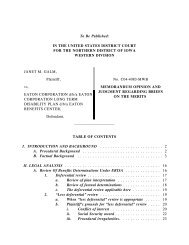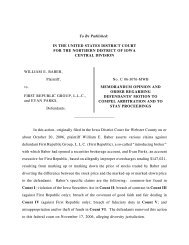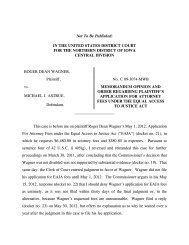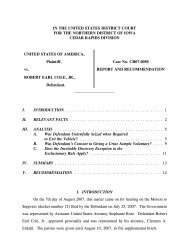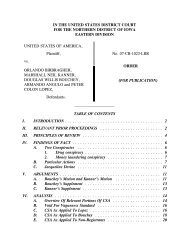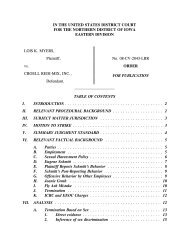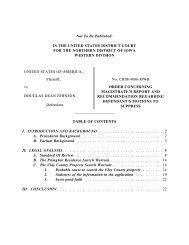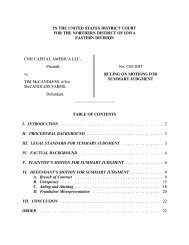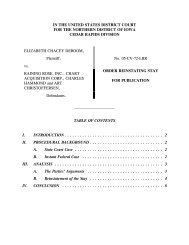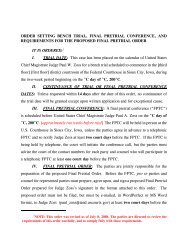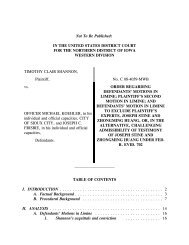Arnzen v. Palmer - Northern District of Iowa
Arnzen v. Palmer - Northern District of Iowa
Arnzen v. Palmer - Northern District of Iowa
You also want an ePaper? Increase the reach of your titles
YUMPU automatically turns print PDFs into web optimized ePapers that Google loves.
CCUSO is not a prison, and the plaintiffs are not convicted prisoners. They have been<br />
civilly committed to CCUSO because they have been adjudged to be “dangerous persons”<br />
under <strong>Iowa</strong> law. As such, they retain some <strong>of</strong> their liberty interests, although those<br />
interests “are considerably less than those held by members <strong>of</strong> free society.”<br />
Senty-Haugen v. Goodno, 462 F.3d 876, 886 (8th Cir. 2006); see Revels v. Vincenz, 382<br />
F.3d 870, 874 (8th Cir. 2004) (“[a]lthough an involuntarily committed patient <strong>of</strong> a state<br />
hospital is not a prisoner per se, his confinement is subject to the same safety and security<br />
concerns as that <strong>of</strong> a prisoner,” even though the Eighth Amendment does not apply).<br />
In Serna v. Goodno, 567 F.3d 944 (8th Cir. 2009), the Eighth Circuit Court <strong>of</strong><br />
Appeals discussed the rights retained by persons involuntarily committed to a state sex<br />
<strong>of</strong>fender facility:<br />
1 (...continued)<br />
1992) (right to bodily privacy applies “even in the prison context”); see also Boss v. Morgan County, Mo.,<br />
No. 2:08-cv-04195-NKL, 2009 WL 3401715, at *4 (W.D. Mo. Oct. 20, 2009), where the court held as<br />
follows:<br />
Under Eighth Circuit law, “while inmates may lose many freedoms at the prison gate, they<br />
retain at least some <strong>of</strong> their constitutional rights while confined.” Timm v. Gunter, 917<br />
F.2d 1093, 1099 (8th Cir. 1990) (citing Turner v. Safley, 482 U.S. 78, 84, 107 S. Ct.<br />
2254, 96 L.Ed.2d 64 (1987)). The Eighth Circuit has further recognized that inmates have<br />
a right to bodily privacy, which must be weighed against institutional concerns <strong>of</strong> safety<br />
and equal employment opportunities. Id. at 1101 (“Whatever minimal intrusions on an<br />
inmate’s privacy may result from [opposite sex surveillance <strong>of</strong> male inmates by female<br />
guards], whether an inmate is using the bathroom, showering, or sleeping in the nude, are<br />
outweighed by institutional concerns for safety and equal employment opportunities.”); see<br />
also Fortner v. Thomas, 983 F.2d 1024, 1030 (11th Cir. 1993) (recognizing “a prisoner’s<br />
constitutional right to bodily privacy because most people have ‘a special sense <strong>of</strong> privacy<br />
in their genitals, and involuntary exposure <strong>of</strong> them in the presence <strong>of</strong> people <strong>of</strong> the other<br />
sex may be especially demeaning and humiliating’” (quoting Lee v. Downs, 641 F.2d<br />
1117, 1119 (4th Cir. 1981))); Covino v. Patrissi, 967 F.2d 73, 78 (2d Cir. 1992)<br />
(explaining that “we have little doubt that society is prepared to recognize as reasonable<br />
the retention <strong>of</strong> a limited right <strong>of</strong> bodily privacy even in the prison context”).<br />
5



